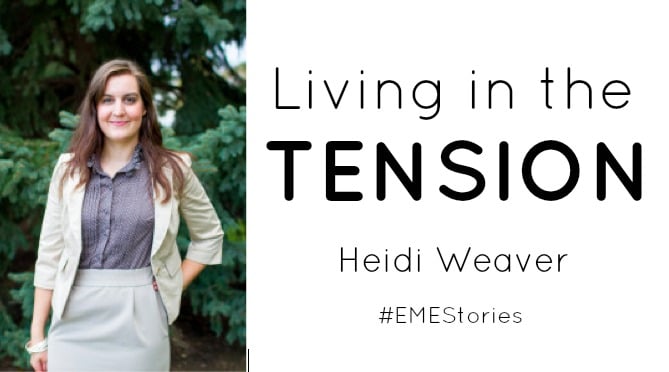Today I present a statement I have agonized over, knowing it will be misinterpreted by many, particularly my friends in conservative Evangelical circles. When I was first invited to join the advisory board for Evangelicals for Marriage Equality (EME), I said no. I wasn’t refusing because I didn’t support their mission – I was refusing because of the ways I was concerned it would compromise my relationships with Evangelicals I love. And frankly, I was tired of losing them.
It became apparent to me, soon after I balked at the notion of publicly supporting EME’s work, that while my heart was probably in the right place (deference to those with whom I live in spiritual community), I could not feel it was morally superior to stand aside quietly, while not offering an alternative way to view this utterly dreadful rights war. It seemed more and more like Christ’s example to stand in solidarity with the marginalized and to beg my fellow Evangelicals to think more deeply about the concerns that my LGBTQ friends are voicing. It felt less and less like Christ’s example to play things safe with my Christian friends while I ignored the cries of so many who were being mistreated.
I hope that you will actually read my statement (below) which explains why I am proud to be associated with the Evangelicals For Marriage Equality, and why I support the EME statement itself. You might be pleasantly surprised by the eagerness you hear there to affirm all people’s rights, both those of conservative Christians and those of LGBT individuals and couples. In particular, I’m thankful for the way EME enters the discussion with an affirmation of the dignity, humanity, and belovedness of all people in the sight of Christ, no matter what stance they may have on rights debates.
~~~~~
By Heidi Weaver, Advisory Board Member, Evangelicals for Marriage Equality The last decade has seen dramatic progress in the LGBT rights movement causing an intensified need for thoughtful and careful reflection on the interaction between the Church and the LGBT community. Many Evangelicals are beginning to realize the LGBT community is not just outside of our faith groups, but rather inside the walls of our churches. And sometimes they are making demands for equality, protection, and restoration. As arguments on orthodoxy and sexuality wage on, the LGBT community is left wondering how those who ascribe to the teachings of Christ can defend discriminatory behaviors towards sexual minorities, while thoughtful, kind-hearted pastors are sometimes labeled as bigots merely for subscribing to the traditional Scriptural interpretation of sexual ethics. Evangelicals for Marriage Equality (EME) humbly enters this tension, and I’m proud to be associated with the organization. The EME approach holds great potential for separating governmental standards for marriage from Church standards, eliminating discriminatory legislation that currently denies over 1000 rights to LGBT parents and spouses, while acknowledging the rights of churches and clergy to politely decline performing these marriages on the basis of deeply held beliefs. The Church must remember that its testimony to the world is far broader than just believing the right things about marriage – it’s about our posture towards those in a pluralistic culture who are convinced differently. Following in the model of Christ, we seek not to dominate or control, but to love and serve not just those with whom we align, but also those who seem to fall on the ‘other’ side. In today’s culture-wars, convicted and civil Christians are few and far between. To hold convictions with such strength that we become hostile towards those who believe differently is easy. To be so civil that we entirely lack the ability to draw appropriate boundaries in faith communities is easy. We must instead be the kind of Christians who hold personal convictions and compassion for the marginalized closely together. Evangelicals for Marriage Equality serves as an example in a conversation currently hijacked by fearfulness, anger, and self-protection that thoughtful, faithful, sacrificial, and compassionate Christians still exist. We must give ourselves towards work that protects the rights of all people. Together, we can and will change the conversation on faith and sexuality to what really matters, being like the Jesus we desperately love, even towards those we find most threatening.
~~~~~
I hope if you haven’t yet become acquainted with the EME approach, you will take the opportunity to do so now, and consider adding your voice to the growing list of Evangelicals that are declaring there’s a better way for the church to proceed forward. I’ll leave you, some of my favorite Evangelicals, with one of my favorite excerpts from the EME statement, and an invitation for your thoughtful and kind responses, questions, or concerns below.
Many evangelicals—including some of our close friends and family—see things differently. It is not our intention to shame them through name-calling or hostile debate. Where disagreements exist, we believe that progress can be made when compassionate, respectful dialogue is encouraged. In particular, evangelicals who don’t support marriage equality need to be allowed the space to express their objections without the assumption that their opposition comes from a place of bigotry. Similarly, those who do support marriage equality should be able to express their beliefs in Christian community without the assumption that they have abandoned their core theological commitments. – Excerpt from Evangelicals for Marriage Equality Statement
Shalom.












